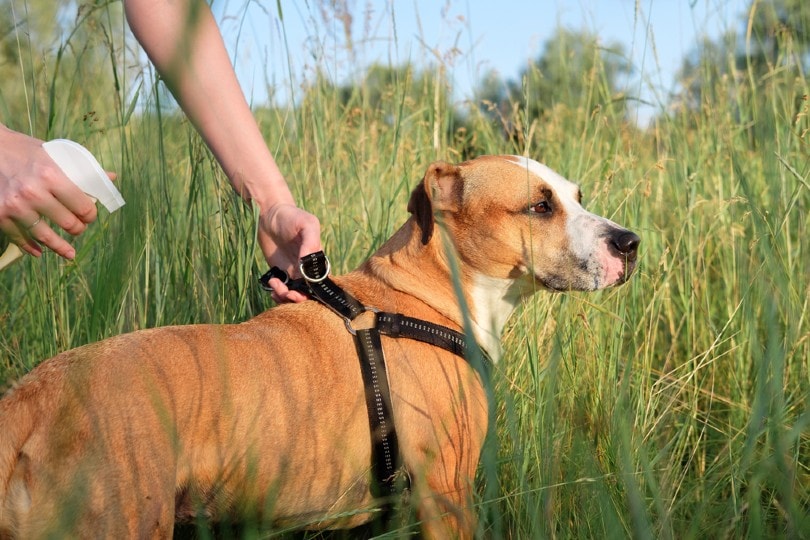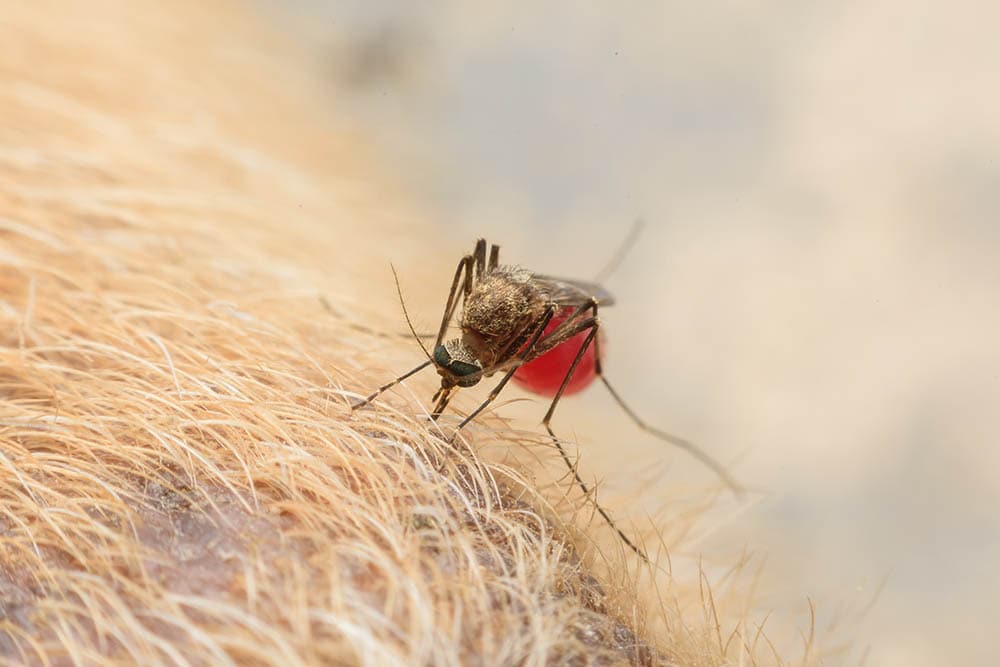It may seem that your furry friend is safe from mosquitoes because it makes sense to us that its fur should be a sufficient barrier. Unfortunately, this is not the case, and although your pooch may not seem to be bothered (while you aggressively swat them away), your dog can absolutely get bitten by mosquitoes.
A mosquito’s proboscis can penetrate through a thick layer of fur, and although your pup can be bitten anywhere, it is more common on vulnerable parts like the nose, ears, and belly.
Mosquito bites are concerning because dogs are at risk for heartworm disease, so it is important to try to keep the parasites away from your dog and understand how to keep your best friend safe and protected.
Can Mosquito Bites Harm My Dog?
Unfortunately, itching and discomfort are not the only issues facing your dog if it gets bitten by a mosquito. Some dogs can be allergic, resulting in a reaction. While It’s not common, you will need to contact your vet for treatment.
Heartworm disease is a serious condition caused by mosquitoes. The heart and pulmonary arteries can become clogged by the parasites and lead to heart failure. When a mosquito bites a canine infected with heartworms and moves on to the next host, the disease can be passed on to the new canine. Check this map to see how prevalent heartworm is in your state.

 How Do I Know My Dog Has Been Bitten?
How Do I Know My Dog Has Been Bitten?
A mosquito bite on your pup is not often visually obvious, but your dog will experience irritation and itching just like humans. If you notice your dog is constantly scratching and rubbing its ears and nose it could be trying to find relief from the incessant itch of a mosquito bite.
Some dogs are also prone to swelling if they have an allergic reaction to the bite. It is important to help them stop scratching since they can break the skin and cause a possible bacterial infection.
- See Also: How Much Does Dog Allergy Testing Cost?
Signs of Heartworm Disease in Dogs
The signs your dog is experiencing can determine the seriousness of the infection. When you recognize the heartworm signs early, your pet will have a better chance at a speedy recovery.
- Lethargy or weakness
- Coughing
- Difficulty breathing or shortness of breath
- Weight loss
- Collapse or in severe cases, sudden death.
If your dog is showing any of these signs and you are seeking the best possible treatment for your pup, we recommend speaking with a vet.
If you need to speak with a vet but can’t get to one, head over to PangoVet. It’s an online service where you can talk to a vet online and get the personalized advice you need for your pet — all at an affordable price!
How Do I Treat Mosquito Bites on My Dog?
If you determine that your dog is experiencing discomfort from a mosquito bite, you can minimize the swelling and itching by using a cold compress on the wound. If your dog has been scratching and opening the skin, wash the area with dog-friendly soap to avoid infection. Ask your veterinarian if they can recommend a treatment if your dog’s discomfort is severe, but this itching should usually subside after a few days.
A thorough understanding of heartworm signs is imperative in protecting your pooch and possibly saving its life. If your dog has been diagnosed with heartworm, your vet will prescribe the appropriate medications, but prevention is better than cure as treatment carries some risk.

How Do I Keep Mosquitoes from Biting My Dog?
When mosquito season is approaching, plan ahead and be prepared. Plan your dog’s activities and ensure you have repellents and treatment on hand.
- Mosquito repellent: Speak to your vet about the best options for mosquito repellent. Repellents used for humans must never be used on your dog as some of the ingredients can be dangerous.
- Time your dog’s outings: Mosquitoes are most active during dusk and dawn and at night, so plan your walking route away from stagnant water or any area where mosquitoes are typically found waiting for their prey.
- Repel mosquitoes from your yard and home: You can deter mosquitoes by burning citronella candles or treating your yard with a spray. You can also attach screens on windows and doors to help prevent these critters from entering your home. A fan can also help deter them, so place your dog’s bed near a fan to create an obstacle they won’t win against.
- Remove stagnant water: Remove any stagnant water that can be found around the house, as this is where mosquitoes choose to lay their eggs. This could be the dog’s water bowl, bird bath, an untreated pool, pool coverings that may have collected water, any leakage from the septic tanks and anything that may have collected water.
- Treat your dog with heartworm preventative medications: Heartworm Prevention is preferable to treatments, and there are multiple preventative brands that are affordable. Consult your vet for recommendations.
Final Thoughts
Mosquitoes are just as irritating to our dogs as they are to us, and our poor pooches are unable to protect themselves as well as we can. It’s up to us to protect them from these mosquitoes, especially because an itchy reaction is not the only concern.
Warm weather inevitably brings an influx of mosquitoes, but that doesn’t mean your dog can’t enjoy the outdoors. By being proactive, knowledgeable, and prepared, you can reduce the risks of severe discomfort and possible infection, and you can be equipped to help your pet if the pests manage to take a bite.
See also:
- Is Snail Bait Safe for Dogs?
- What to Do if Your Dog Is Stung by a Scorpion? Vet Approved Signs & Treatment
Featured Image Credit: ArtLovePhoto, Shutterstock













